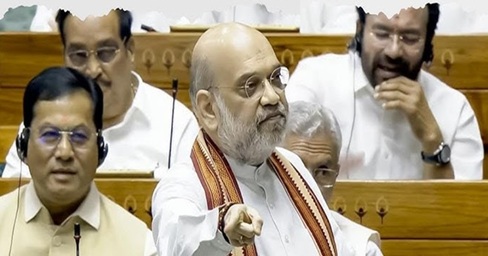| (Mains Exam, General Studies Paper- 2: Parliament and State Legislatures- Structure, Functions, Conduct of Business, Powers and Privileges and Issues Arising Thereof) |
Reference
Home Minister Amit Shah introduced a bill in the Lok Sabha to remove the Prime Minister, Chief Ministers and Ministers facing serious charges. However, after a voice vote, the bill has been referred to the Joint Parliamentary Committee (JPC).

Key Features of the Bill
- The 130th Constitution Amendment Bill provides for the removal of the Prime Minister, Chief Ministers or any other minister of the Central or State Government from office if they are arrested and detained in serious criminal cases.
- The provisions of this bill will also apply to the Union Territory of Delhi.
- Two other bills have also been introduced to apply these provisions to the Union Territories of Puducherry and Jammu and Kashmir.
- Government of Union Territory (Amendment) Bill, 2025
- Jammu and Kashmir Reorganisation (Amendment) Bill, 2025
- The Bill proposes amendments to Articles 75, 164 and 239AA to introduce a legal mechanism that would order the removal of ministers detained for offences punishable with imprisonment for a term of five years or more.
Grounds for removal
- A minister will be removed from office if:
- He is charged with an offence punishable with imprisonment for a term of five years or more.
- He is arrested and thereafter detained for a period of 30 consecutive days.
Procedure for removal
- The President shall remove a minister of the Central Government on the advice of the Prime Minister. This advice is to be given when the minister remains in detention for the 31st consecutive day.
- If the Prime Minister does not advise the President by this time, the minister will cease to hold office from the next day.
- The same provisions will apply at the state level as well, where the state governor will act on the advice of the chief minister.
- In case of Delhi, the President will be the acting authority on the advice of the chief minister.
- In case of the Prime Minister or the Chief Minister of a state or Delhi, he has to resign by the 31st consecutive day of detention.
- If he does not resign by this time, he will cease to hold office from the next day.
- Removal authority:
- President (for Prime Minister and Union Ministers)
- Governor (for Chief Ministers and State Ministers)
- Lieutenant Governor (for Ministers of Union Territories)
No bar on reappointment
A minister removed from office under these provisions can be reappointed after his release from detention.



